Biotech companies have tested 25 types of coffee in chain stores for suspected toxic estrogens!
Professional coffee knowledge exchange more coffee bean information please follow the coffee workshop (Wechat official account cafe_style)
With the vigorous promotion of major coffee brands, modern people are no stranger to coffee, but there are still many people who worry about this kind of "Palai", especially the color change of caffeine in coffee. However, apart from caffeine, will there be other harmful substances in coffee?! Recently, Silver in Water, a Hong Kong biotechnology company, has adopted biological detection technology to detect 37 cups of coffee from a number of chain coffee shops and restaurants in Hong Kong. Only 12 cups have passed toxicological tests, while the remaining 25 cups have been found to contain acute toxicity or estrogens. It may cause infertility or damage the liver and cause cancer.
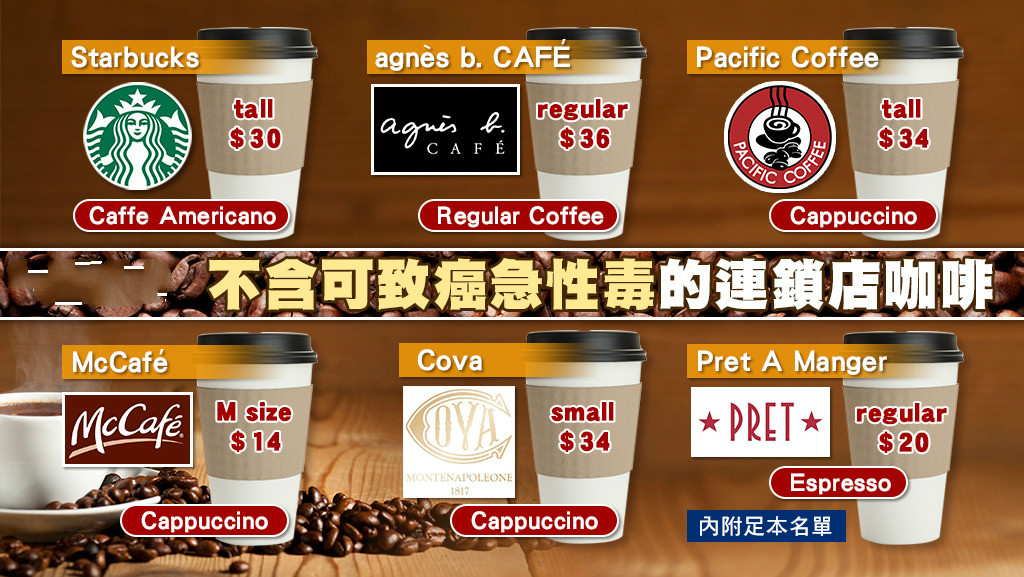
Of the 37 coffees tested for silver in the water, only 12 passed the toxicological test and did not contain estrogen or acute toxins.
Mercury buys 37 cups of coffee from different local coffee shops and restaurants in Hong Kong. Apart from Hong Kong brands, there are also brands from France, Italy, New Zealand, the United Kingdom and the United States, including "Agnes B Caf é", "Starbucks", "McCaf é", "Pret A Manger", "Pacific Coffee" and "Cova".
Category of 37 cups of coffee:
12 cups of foam coffee (Cappuccino)
13 cups of American coffee (Americano / American Black)
12 cups of espresso (Espresso)
Silver in the water used free embryos of transgenic mackerel and medaka to detect estrogenic endocrine interferon technology, and zebrafish embryos were used for acute toxicological tests. it was found that of the 37 coffee samples, only 12 samples passed the above two tests, 23 contained acute toxins and 7 contained estrogens.
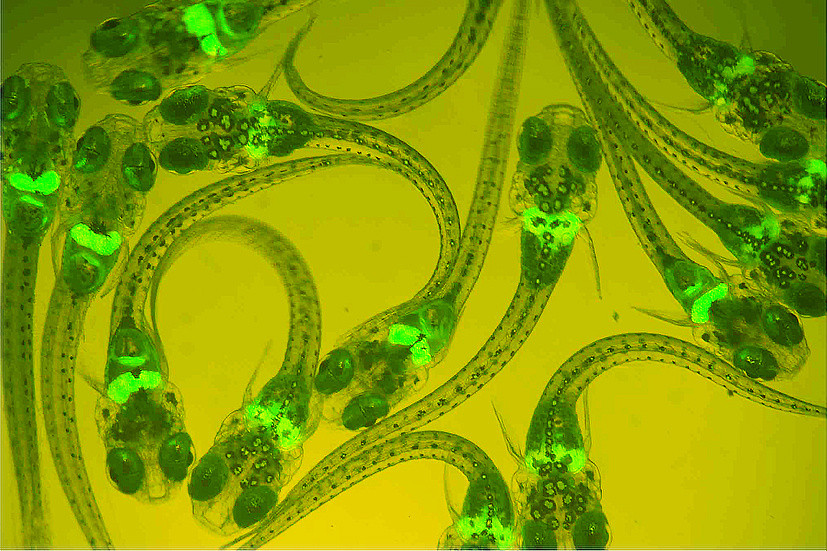
In the estrogenic test of transgenic mackerel medaka embryos, green fluorescence will be emitted when the pollutant reaches a certain concentration.
It is worth noting that espresso and American coffee have a higher proportion of acute toxins, with only three of the 13 American coffees rated as outstanding; among the 12 cups of espresso, only three samples have passed; and of the 12 foam coffee samples, half of the six types of outstanding performance have been rated as green fish.
Chen Xueping, founder and chief technical officer of Silver in Water, explained that estrogen-like endocrine interferon disrupts the endocrine system and has been linked to cancer, infertility, premature development and insanity.
As for acute toxicological tests, thousands of toxic chemicals can be detected, because zebrafish and human disease-related genetic similarity is as high as 84%, that is, substances harmful to zebrafish are also likely to be harmful to humans.
Chen pointed out that 25 samples were found to have failed the acute toxicity test, accounting for more than 2% of all samples. She explained that more than a thousand toxic compounds could be detected in acute toxicological tests of zebrafish embryos, some of which were even carcinogenic. According to the available information, caffeine per cup has been confirmed that the concentration of caffeine will not kill mackerel and zebrafish embryos, so the effect of caffeine in this test is excluded.
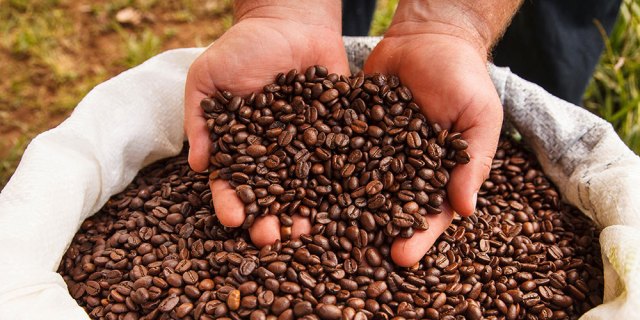
She also pointed out that although acute toxicological tests on zebrafish embryos could not determine exactly which toxin was contained in coffee, earlier studies had pointed out that coffee roasted at a high temperature would produce Acrylamide, a substance that may cause cancer in humans, and there were also reports of pesticide residues in coffee beans or aflatoxins that damage the liver due to improper storage or transportation.
List of 12 non-toxic and estrogenic coffees:
"Agn è s b. CAF É" Regular Coffee ($36 / regular)
"fuel espresso" Caf é Americiano ($39 / regular)
"Starbucks" Caffe Americano ($30 / tall)
"McCaf é" Cappuccino ($14 / M)
"Pret A Manger" Cappuccino ($34 / regular)
"Pacific Coffee" Cappuccino ($34 / tall)
"Segafredo Zanetti Espresso" Cappuccino ($35 / regular)
"Cova" Cappuccino ($34 / small)
"fuel Espresso" Classic Blend Cappuccino ($52 / regular)
"Agn è s b. CAF É" Double Espresso ($30 / double)
"McCaf é" Espresso ($15.5 / regular)
"Pret A Manger" Espresso ($20 / regular)
Enthusiasts who have been following food safety information for a long time may have some impression of this Hong Kong "silver in the water" biotechnology company. In July 2017, the silver in the water biotech company tested 30 instant coffee samples from 11 brands on the market on a similar principle. It was found that instant coffee was 1.8 times more toxic than chain coffee, and as many as 33% of the samples failed the toxicity test.
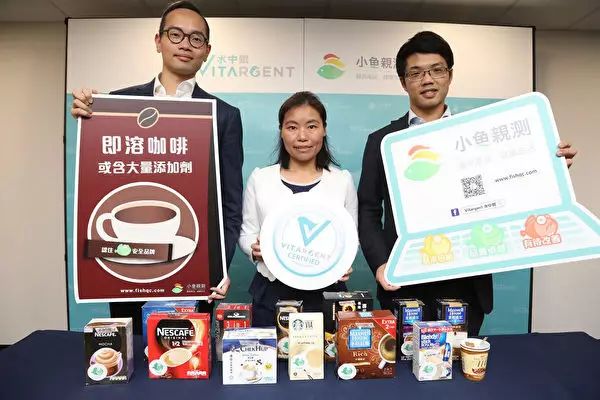
In the investigation on instant coffee, it was found that the coffee content in most samples accounted for only 5-9% of the total ingredients, which was not the source of toxicity. It was inferred that the toxicity mainly came from the remaining 90% of beverage additives, including stabilizers, emulsifiers, anticoagulants, seasonings and so on.
Founded in 2010, "Silver in Water" Biotechnology Co., Ltd. aims at food, skin care cosmetics, health products, maternal and baby products and other consumer goods market, with biological detection technology as a supplement to the traditional physical and chemical components detection, with a tail "small fish" to stir up the safety standards of the major consumer goods industry. The zebrafish embryo acute toxicity test, transgenic mackerel medaka embryo estrogen test and product composition screening algorithm developed by silver in water have pre-treatment technology, testing process patent pool and database, and have been commercialized.
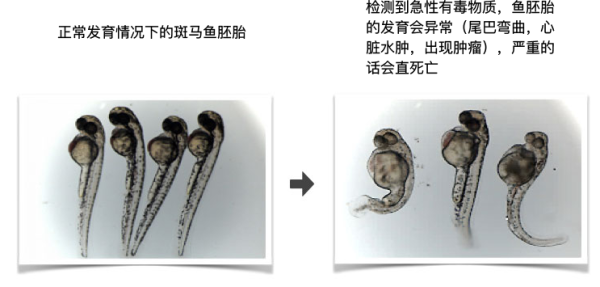
At present, compared with the traditional detection methods for accurate analysis of a single chemical component, the advantage of biological detection is that it can quickly and comprehensively reflect the biological toxicity of the product, and is not limited to the known toxins within the target range. and can reflect the comprehensive biological toxicity of a mixture of multiple components, and avoid the risk of "cocktail effect".
According to 36 krypton reports, Silver in Water has the only fish roe toxicology testing center in Asia that has been certified by international standards ISO17025. It has laboratories in Hong Kong, Taiwan and Belgium, and its test results have been officially recognized in more than 100 countries or economies around the world. It has provided product testing, raw material testing, supplier screening and consulting services for L'Or é al, Nivea, Yili, Hong Kong Cuihua Group, Junlebao, Infinity, Dinghushan Spring and other enterprises. the unit price ranges from ten thousand yuan to one million yuan according to the project demand.
Up to now, Bank of China has accumulated strategic investments from investors such as PricewaterhouseCoopers, China Economic Cooperation Group, Yingnuo Capital, City University of Hong Kong Fund, Hong Kong Group, Liuhe Group, Babaluba Industries Group, Bridgefield, he Family of Macau, Guangdong Yinghan Group and so on.
Photo Source: Internet
Partial reference: 36 krypton
END
Important Notice :
前街咖啡 FrontStreet Coffee has moved to new addredd:
FrontStreet Coffee Address: 315,Donghua East Road,GuangZhou
Tel:020 38364473
- Prev
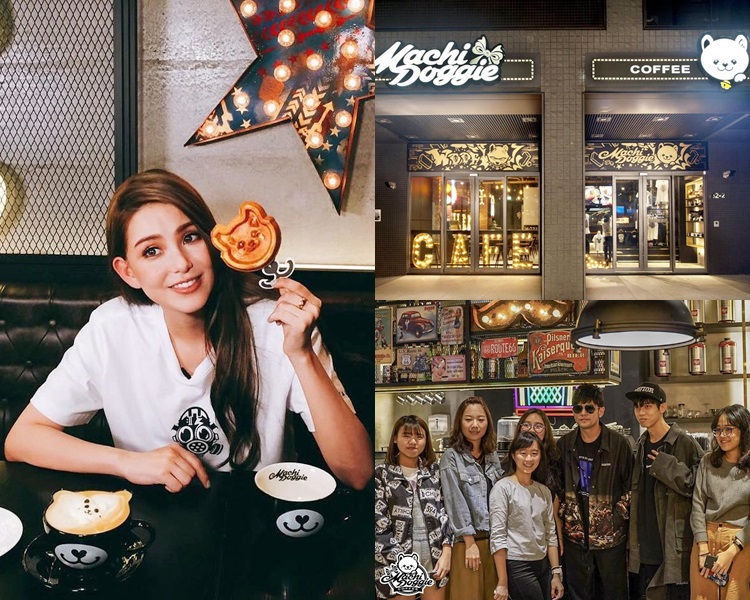
Kunling Coffee Shop announced that it would be closed. Jay Chou couldn't wait! Is it easy for a celebrity coffee shop to close down?
Professional coffee knowledge exchange More coffee bean information Please pay attention to coffee workshop (Weixin Official Accounts cafe_style) Kunling pet coffee shop announced closure! The wife of superstar Jay Chou, Kunling, runs a pet cafe as well as a personal clothing brand. However, the cafe recently announced that it would close due to the expiration of its lease. Kunling Pet Coffee Shop Ma Named after Machi
- Next
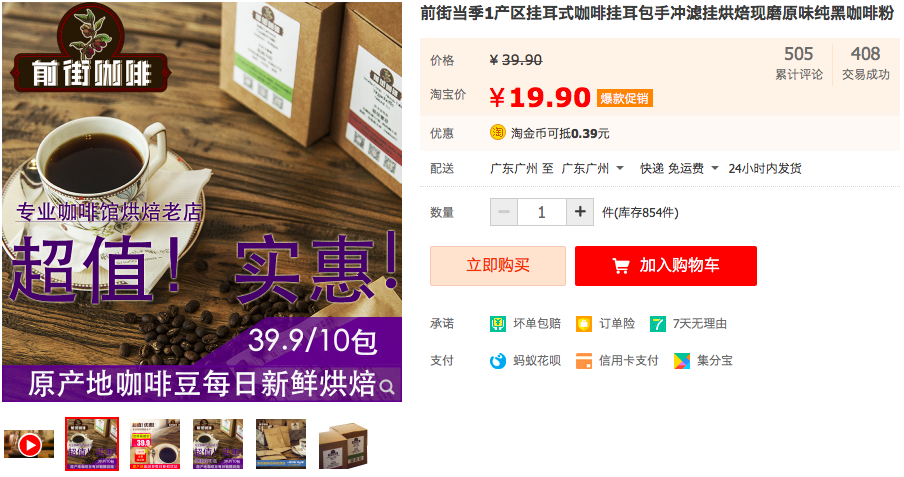
A special gift for Queen's Day! Select rations, beans, wash Yega, Mantenin 9.9 attack again!
Professional coffee knowledge exchange more coffee bean information please follow the coffee workshop (Wechat official account cafe_style) Women's Day special! In this special event, Qianjie Coffee will provide you with two selected ears, four preferential rations beans and four boutique beans! Beautiful half of the sky, you are the biggest today! Hang ear piece Qianjie selected single producing area hang ear one box of ten packets of single product
Related
- The ceremony is full! Starbucks starts to cut the ribbon at a complimentary coffee station?!
- A whole Michelin meal?! Lucky launches the new "Small Butter Apple Crispy Latte"
- Three tips for adjusting espresso on rainy days! Quickly find the right water temperature, powder, and grinding ratio for espresso!
- How much hot water does it take to brew hanging ear coffee? How does it taste best? Can hot water from the water dispenser be used to make ear drip coffee?
- What grade does Jamaica Blue Mountain No. 1 coffee belong to and how to drink it better? What is the highest grade of Blue Mountain coffee for coffee aristocrats?
- What are the flavor characteristics of the world-famous coffee Blue Mountain No. 1 Golden Mantelin? What are the characteristics of deep-roasted bitter coffee?
- Can I make coffee a second time in an Italian hand-brewed mocha pot? Why can't coffee be brewed several times like tea leaves?
- Hand-brewed coffee flows with a knife and a tornado. How to brew it? What is the proportion of grinding water and water temperature divided into?
- What is the difference between Indonesian Sumatra Mantinin coffee and gold Mantinin? How to distinguish between real and fake golden Mantelin coffee?
- What does bypass mean in coffee? Why can hand-brewed coffee and water make it better?

